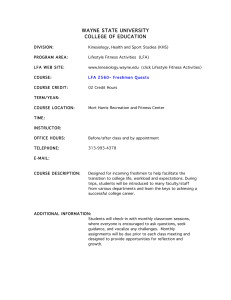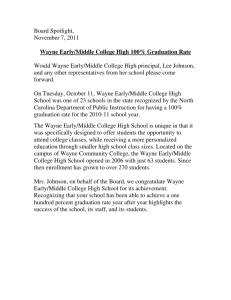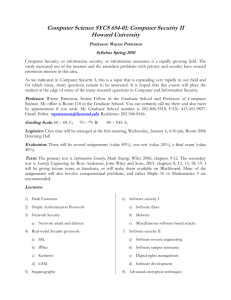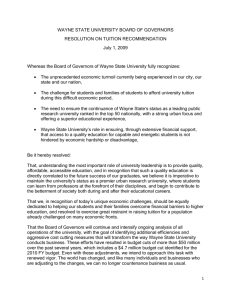File
advertisement
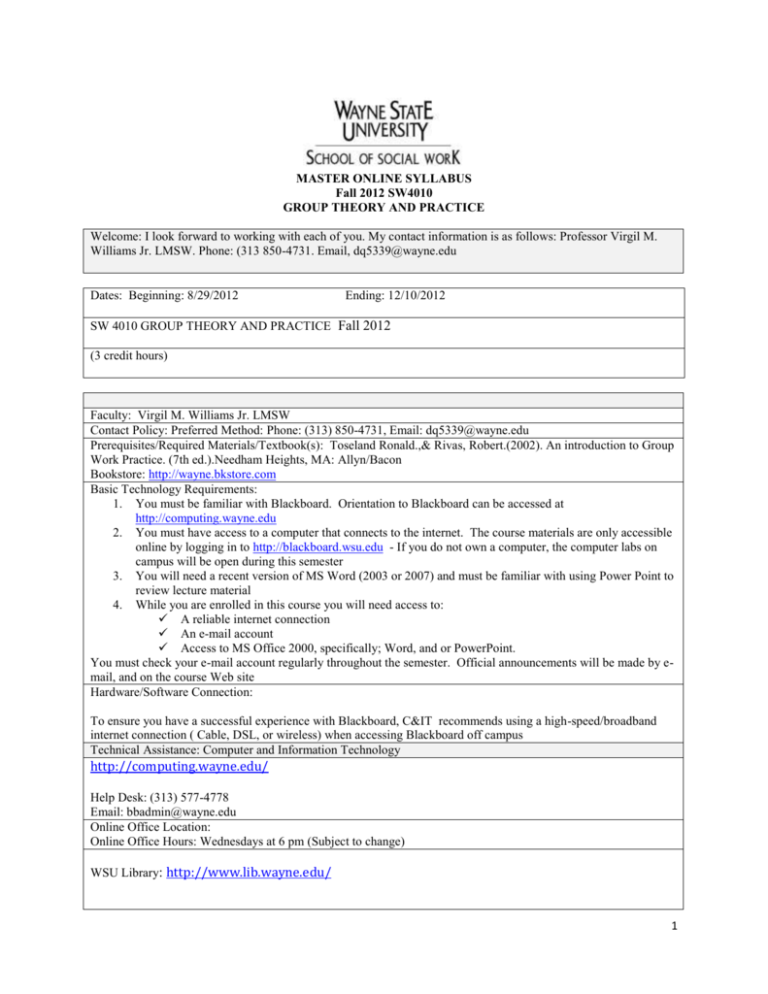
MASTER ONLINE SYLLABUS Fall 2012 SW4010 GROUP THEORY AND PRACTICE Welcome: I look forward to working with each of you. My contact information is as follows: Professor Virgil M. Williams Jr. LMSW. Phone: (313 850-4731. Email, dq5339@wayne.edu Dates: Beginning: 8/29/2012 Ending: 12/10/2012 SW 4010 GROUP THEORY AND PRACTICE Fall 2012 (3 credit hours) Faculty: Virgil M. Williams Jr. LMSW Contact Policy: Preferred Method: Phone: (313) 850-4731, Email: dq5339@wayne.edu Prerequisites/Required Materials/Textbook(s): Toseland Ronald.,& Rivas, Robert.(2002). An introduction to Group Work Practice. (7th ed.).Needham Heights, MA: Allyn/Bacon Bookstore: http://wayne.bkstore.com Basic Technology Requirements: 1. You must be familiar with Blackboard. Orientation to Blackboard can be accessed at http://computing.wayne.edu 2. You must have access to a computer that connects to the internet. The course materials are only accessible online by logging in to http://blackboard.wsu.edu - If you do not own a computer, the computer labs on campus will be open during this semester 3. You will need a recent version of MS Word (2003 or 2007) and must be familiar with using Power Point to review lecture material 4. While you are enrolled in this course you will need access to: A reliable internet connection An e-mail account Access to MS Office 2000, specifically; Word, and or PowerPoint. You must check your e-mail account regularly throughout the semester. Official announcements will be made by email, and on the course Web site Hardware/Software Connection: To ensure you have a successful experience with Blackboard, C&IT recommends using a high-speed/broadband internet connection ( Cable, DSL, or wireless) when accessing Blackboard off campus Technical Assistance: Computer and Information Technology http://computing.wayne.edu/ Help Desk: (313) 577-4778 Email: bbadmin@wayne.edu Online Office Location: Online Office Hours: Wednesdays at 6 pm (Subject to change) WSU Library: http://www.lib.wayne.edu/ 1 Course Management Considerations 1. Time management is a key element in successfully completing this course. 2. Please do not hesitate to contact me when you are experiencing problems. 3. Remember it is important to be courteous to your fellow classmates. It is absolutely ok to disagree to disagree with posts however, put downs are unacceptable. 4. You are in charge of your learning, make your efforts count. Be aware there may be technical glitches. Stay calm and contact the call center via E-mail at http://computing.wayne.edu/ Course Requirements Read the assigned readings Engage in positive and meaningful dialog with classmates concerning the topic being discussed Answer discussion questions and present reasoning behind answers given to other questions Log onto the course at least 5 days per week and demonstrate presence through posting and interaction Complete all required postings and assignments Student Code of Conduct: Please visit Http://www.doso.wayne.edu/codeofconduct.pdf Educational Accessibility Services (EAS) Any student who feels s/he may need an accommodation based on the impact of a disability should contact me privately to discuss you specific needs. Course Domain and Boundaries The course is a continuation of four-course sequence. It builds upon the knowledge, skills and values learned in prior courses within this sequence. Utilization of systems and problem-solving approaches to plan for and apply appropriate social work intervention with emphasis on the utility of groups in practice at all systems levels, e.g. macro A major focus of SW4010 is on the development and utilization of communication, relationships and group membership skills. Students will become familiar with planning group, clarifying a group purpose, and assessing process and outcome. This course emphasizes a laboratory approach which will provide the student an opportunity to develop skills in facilitating groups in micro and macro practice necessary for generalist social work practice. The concepts, theories principles, methods and skills relevant to group work with diverse populations will be explored in this course. The application of group work methods with populations-at-risk will also be examined in this course. This course incorporates content on types of groups, group development, problem-solving and decision making in groups. It also explores the interaction between groups and systems with their external environment 2 COMPETENCIES 1- Identify as a professional social worker and conduct oneself accordingly 2 -Apply social work principles to guide professional values to guide practice 3 - Apply Critical thinking to inform and communicate professional judgments 9 - Respond to contexts that shape practice 10- Engage, assess, intervene, and evaluate with individuals, families, groups, organizations, and communities Benchmarks: Analysis of group development and group behavior in early stages and behavior during the middle and termination phases II. LEARNING OUTCOMES By the end of this course the student will be able to: A. differentiate between personal and professional standards in their professional role with clients (Competency 2A) B. identify opportunities and implement strategies to advocate for clients differentiate between personal and professional standards in their professional role with clients (Competency 2D) C. utilize affective and intellectual processes to critically evaluate knowledge from related disciplines in conjunction with social work skills and values to help client systems (Competency 3 A) D. develop client assessment through observations and other data collection (Competency 10 A-1) E. develop a client treatment plan (Competency 10A-3) F. apply theoretical concepts regarding the process and dynamics of groups and including group norms, goal, roles, communication patterns, decision making methods, leadership styles, power, conflict management and evaluation (Competency 10 B) G. utilize communication skills particularly those of active listening and feedback as a process within the group (to monitor practice interventions (Competency 10 A-2; Competency 3C) H. plan their group’s behavior as facilitator based upon an analysis of the group’s needs (to monitor group interaction) (Competency 10- C-2) I. utilize empathic responding and problem solving as the dominate process in generalist practice (Competency 10C) J. help clients advocate for needed services Competency 10-C-4) K. write mutually agreed upon goals and contracts with client systems L. develop intervention strategies M. demonstrate generalist skill in client intervention N. demonstrate an ability to help clients/communities build on and use their strengths O. demonstrate an understanding and apply the ecological framework to monitor for evaluation III. PERFORMANCE CRITERIA A. Basic Technology Requirements 1. You must be familiar with Blackboard. Orientation to Blackboard can be accessed at http://computing.wayne.edu 2. You must have access to a computer that connects to the internet. The course materials are only accessible online by logging in to http://blackboard.wsu.edu 3 If you do not own a computer, the computer labs on campus will be open during this semester 3. You will need a recent version of MS Word (2007- 2010) and must be familiar with using Power Point 4. While you are enrolled in this course you will need access to: A reliable internet conn An e-mail account Access to MS Office 2000 and above, specifically; Word, and or PowerPoint. 5. You must check your Wayne State University e-mail account regularly throughout the semester. Official announcements will be made by e-mail, and on the course Web site. B. Student Achievement of Learning Outcomes Student outcomes are assessed by a midterm and final exam, Blackboard discussion participation, weekly one page reflection papers, and a written assessment of the group process and the various types of groups you will encounter as a professional social worker. C. Course Policies Assignment Policy: 1. Late papers (those not turned in on assigned day), will be downgraded by one grade, i.e. if the paper is deemed to be an A paper, it will be given a B due to lateness. Each rewrite of a paper will be downgraded by five points. A zero will be factored in for missing work. 2. Students are expected to complete all readings, participate in class and perform satisfactorily on assignments and examinations. The instructor shall be notified of unavoidable issues in advance which may (will) prevent compliance with assignment due date. Unless there are serious extenuating circumstances, a student will not be able to earn an A for the course with more than two sessions of non-participation a B with more than four sessions of non-participation, or a C with more than five sessions of non-participation. No incomplete will be given in this class. 3. PLAGIARISM/ACADEMIC HONESTY: “Plagiarism is using another person’s words or ideas without giving credit to the other person. When you use someone else’s words, you must put quotation marks around them and give the writer or speaker credit by revealing the source in a citation. Even if you revise or paraphrase the words of someone else or just use their ideas, you still must give the author credit in a note.” http://www.otl.wayne.edu/pdf/2006_july_aibrochure. 4 (William Harris, “Anti-Plagiarism Strategies for Research Papers,” http://virtualsalt.com/antiplag.htm, March 7, 2002) 2. You must cite sources from the Internet or any other form of electronic media used in your work. Any paper suspected of plagiarism will be reviewed at Turnitin.com to verify that it is your work and properly cited. 3. Any paper that is plagiarized will result in an “F” for the class and a referral to the University for further Disciplinary Action. 4. APA FORMAT All papers written in the School of Social Work require APA format. You may purchase the Publication Manual of the American Psychological Association (6th edition), or you may visit the website listed below http://owl.english.purdue.edu/owl/resource/560/01/ 5. WIKIPEDIA WILL NOT BE ACCEPTED AS A RELIABLE SOURCE What is Wikipedia? “Wikipedia is a free-content encyclopedia, written collaboratively by people from all around the world. The site is a wiki, which means that anyone can edit entries simply by clicking on the edit this page link.” “Because Wikipedia is an ongoing work to which anybody can contribute, it differs from a paper-based reference source in some important ways. In particular, mature articles tend to be more comprehensive and balanced, while other (often fledgling) articles may still contain significant misinformation, un-encyclopedic content or vandalism. Users need to be aware of this in order to obtain valid information and avoid misinformation which has been recently added and not yet removed.” D. Class Participation/Attendance: 1. Student participation is important to the success of any class. For this online class, your participation is based on you regular (at least once a week) interaction with activities on Blackboard. Your participation will be monitored and if you do not participate for two or more weeks, I will ask you to drop the class. The format for participation will be described at least one week in advance of the due date and will include blogs, discussion boards, and/or Wimba sessions. Responses are evaluated based on content quality. They should reflect familiarity with lecture material and/or the readings and be approximately 200 words. Use citations and references from the readings, in APA format. 2. Note: Class participation includes raising questions from the readings, making relevant comments drawn from personal experience, reacting to opinions 5 expressed by the instructor and students, asking for clarification, being actively engaged in class exercises, or bringing up issues of general interest to the class. Resources Please visit Student Code of Conduct: Http://www.doso.wayne.edu/codeofconduct.pdf Student Disability Services (SDS) If you have a documented disability that requires accommodations, you will need to register with Student Disability Services for coordination of your academic accommodations. The Student Disability Services (SDS) office is located at 1600 David Adamany Undergraduate Library in the Student Academic Success Services department. SDS telephone number is 313-577-1851 or 313-577-3365 (TDD only). Web site: http://studentdisability.wayne.edu/disabilities.php Once you have your accommodations in place, I will be glad to meet with you privately during my office hours to discuss your special needs. I request that you provide me with requests for accommodations at least one week prior to the due date of an assignment or test, so that I can make appropriate arrangements. Student Disability Services’ mission is to assist the university in creating an accessible community where students with disabilities have an equal opportunity to fully participate in their educational experience at Wayne State University. IV. ROLE OF STUDENT AND INSTRUCTOR See university statement of obligation of students and faculty members of the teachinglearning process: http://www.bulletins.wayne.edu/fib/fibd.html TEXT/REQUIRED MATERIALS (http://wayne.bkstore.com ) Toseland Ronald.,& Rivas, Robert.(2002). An introduction to Group Work Practice. (5 th ed.).Needham Heights, MA: Allyn/Bacon 6 Required Reading: Shulman, Lawrence, (1999). The Skills of Helping Individuals, Families, Groups, and Communities (4th ed.). Itasca, ILL: Peacock Publishing. (chapters identified in syllabus). Hepworth, D., Rooney, R., Rooney, G., Gottfried, K., Larson, J. (2006). Direct social Work Practice: Theory and Skills. (7th ed.) Belmont, CA: Thompson/ Brooks Cole (chapters identified in syllabus VI. ORGANIZATION OF THE COURSE This is a 15 week online course. The course will involve review and participation related to readings, lectures, online discussions, and reflections. Students are expected to complete assignments by 11 pm on the due date. All students should actively participate in each session as a means of demonstrating their mastery of the learning outcomes. Social work with groups is taught in an experiential mode to enable the student to learn group work skills first hand. A variety of exercises and lectures are used to introduce theory and provide a basis upon which students learn and practice skills VII. ASSIGNMENTS A. Overview There are four (7) assignments for this class. 1. Each week you are expected to complete a reflection about the week’s activities (chapter readings, discussion, reflection) This assignment is due at 11 pm Sunday evening for each week. 2. Mid- term Exam: You will have access to the test from 12am Saturday morning to 6pm Sunday evening. The test will be timed, and once the test is opened you must complete it. Once the time has expired the test will automatically close. 3. Final Exam: You will have access to the test during the last 3 days of the final exam week. It is important to note the test will be timed. Once the time has expired the test will automatically close. You should also note once the test is opened you must complete it. 7 B. Assignments and Grades Overview Assignment Points 1. Process recording 1 15 2. Process recording 2 15 3. Group Process Analysis 1 25 4. Group Process Analysis 2 25 5. WIMBA Sessions 6 @5points each 30 6. Tests mid- term and final @ 20 points each 40 7. Reflections @ 5 points per week beginning week 2 70 TOTAL VII. 220 Grading Policy: Grade distribution range 220-210 A 165-155 C+ 209-199 A154-144 C 198-188 B+ 143-133 C- 187-177 B 132-122 D+ 176-166 B121-111 D Student may pass the course with a grade of D but must maintain [achieve] a C (2.5) average during the junior and senior years. (See Undergraduate Bulletin, Wayne State University,( p. 483). COURSE OUTLINE Session /Week 1 8/29 2 9/5 3 9/12 4 9/19 5 9/26 Assignments Introduction Review Generalist Practice Definition of concepts Knowledge base of group work practice Focus of Group work practice; definition of groups; classification of groups; group versus individual efforts Differences between casework and group work; intervention targets; influential theories systems, psychodynamic, learning field, and social exchange Planning focus elements of treatment group planning, elements of task group planning, planning model for group work Introducing new members; defining the purpose of the group confidentially facilitating members T&R Chapter.1 Introduction T&R Chapter.2 Historical Developments T&R Chapter 6 Planning the group Quiz chaps 1-3 T&R Chapter 7 The group begins Objectives in the beginning stage 8 6 10/3 7 10/10 8 10/17 9 10/24 10 10/30 11 11/7 12 11/14 13 11/28 motivation Group Dynamics The development of helpful group dynamics; group cohesion; social integration and influence Infuse Leadership and Diversity Leadership and power; Interactional model of leadership Group leadership skills; approaches to multicultural group work work phase/definition of Assessment; the assessment process; assessing the functioning of group members; assessing the functions of the group as a whole; linking assessment to intervention; foster adolescents in a child welfare systems; setting limits: an Adolescent acting-out boys’ group Work phase continues (contracting (role plays)the purpose of goals types of goals guidelines for selecting and defining goals process of mutually selecting and defining goals formulating contracts sample contracts Interviewing skills furthering responses; paraphrasing responses, closed and open-ended responding; seeking concreteness; eliminating nonverbal barriers to effective communication; eliminating verbal barriers to effective communication; gauging the effectiveness of your response. Factors that influence group endings; the process of ending; planned and unplanned termination; ending group meetings; ending the group as a whole Ethical Issues practice values; practice ethics; definition of group work Adolescent discharge group; Task force on research utilization in probation; Program activities for groups of children and activities Task and treatment groups First sessions with children and adolescents ten year old girls in a school setting; unmarried pregnant teens in a shelter Middle stage skills working with the reluctant and resistant group members T&R Chapter 3 Understanding group dynamics T&R Chapter 4 Leadership& chapter 5 leadership and diversity 1st Process Recording due T&R Chapter 8 Assessment Course pack Shulman Chapter 11 The first group sessions: some variations T&R Chapter. 8 Assessment H&L Chapter 12 Negotiating foals and formulating a contract. 1st paper due H&L Chap 6 Verbal following, exploring and focusing skills, chapter7 Eliminating counterproductive communication patterns T&R Chapter 14 Ending the group’s work T&R Chapter 1 Introduction P 6-12 T&R P 485-496 Appendix E-G Appendix E An example of a treatment group proposal Appendix F an Example of a task group proposal Appendix g suggested readings on program activities 2nd Process Recording due T&R Chapter 9 Treatment groups: Foundation Methods & chapter11Task groups: foundation methods 9 14 12/5 Individual in Group the concept of role in a dynamic system the scapegoat in the group; the deviant member; the internal leader; the gatekeeper; the defensive member; the quiet member; the monopolizer Student evaluation, Course wrap-up Course Pack Shulman Chapter 13 work and ending phase paper due 15 12/10 Note: Syllabus may change based on needs of the class TYPICAL ASSIGNMENTS: The assignments presented in this course are reflective of the group process. They include a means by which students can apply both the knowledge and skill objectives of the course. Mid-Term (20 points) A mid-term exam will be given during the semester covering main points in the assigned reading. The mid-term will consist of multiple choices, true /false and or matching questions Final Exam (20 points) A final exam will be given during the semester covering main points in the assigned reading. The mid-term will consist of multiple choices, true /false and or matching questions Process Recordings (2) each process recording has a point value of 10 totaling 20 points. The first Process Recording due session: 10/10 The second Process Recording due session: 11/14 For the assignment use the process recording form provided. You may type in columns or paragraph form. If you use paragraph form include the headings from the process Recording Outline. The Process recording assignments are to record what you observed in the structured role plays carried out in class or in your field placement. Process Recording I will focus on the planning and beginning group sessions. Process Recording II will focus on the middle and ending phases of the structured role plays carried out in class or in your field placement. Include the information below: Attach a diagram of group Use circles for women and brackets for men. Put first names in the circles and brackets. Illustrate the positions of group members, for example in pairs, circles or rows Content A brief summary of the highlights of activities, discussions observed in the session Process Patterns of interaction observed in the group 10 Communication, verbal and nonverbal, etc. indicate in diagram Social Workers behaviors and members roles in the approach-avoidance phase of group development Evidence of diversity (please explain) Group Process Analysis (Paper 1 Planning and beginnings phase, (Paper 2 Middle and Ending phases, Due Week: 10/24 Due Week: 12/5 point value 25 point value 30 The focus in Paper I is the analysis of the groups’ development and the members behavior in the early states. Consider the planning for the group, the first session and sessions two or three. You may write about the structured role play group (s) in class (choose one), or a group from your field placement. The objective of the group process analysis is to help the student develop the ability to remember what s/he observes, separate out her/his thoughts and feelings from the observed behavior and begin to relate theory to observations. Utilize readings, class handouts and lectures regarding small group experiences built into the class. The following outline should be used as a guide. The group process analysis paper will be approximately five pages in length and typewritten. Student should incorporate theories/concepts from the reading assignments in the analysis using APA citation style. • Assessment What is the significance of this session to the group’s development as a whole and to the members? How did the group change as a result of this group session? Was the change a positive one in terms of the group’s development? • Group Dynamics evident in these sessions Group goals and hidden agendas Group norms Level of cohesiveness Group climate Group culture • Impressions What do you think and feel about what transpired in the group session? • Plan of Action How do you plan to change your group behavior? What needs to happen for your group to be more effective? Paper II The same outline as in Paper I is to be applied, however, it is to be applied for the middle and ending phases of the group. • Assessment 11 • • • • What is the significance of this session to the group’s development as a whole and to the members? How did the group change as a result of this group session? Was the change a positive one in terms of the group’s development? Group Dynamics evident in these sessions Group goals and hidden agendas Group norms Level of cohesiveness Group climate Group culture Impressions What do you think and feel about what transpired in the group session? Plan of Action How do you plan to change your group behavior? What needs to happen for your group to be more effective? Based on your observation of diversity, how do you plan to respond? Ending Phase a. Social workers behaviors in the middle and ending phase b. Members role in terms of denial or acceptance. WIMBA Sessions: Structured Role Play (In-classroom Laboratory). These sessions are mandatory and designed to allow you to practice your group work skills. Attendance will be taken at these sessions. There will be 5 sessions throughout the semester 1 Each class member will be assigned randomly to a (role play simulation), group, e.g., by number and will remain in that group for the semester. 2. The groups will continue throughout the semester simulating each phase of group-work 3. Each group will have 2 co-leaders and 6 members (depending on size of class). 4. The various roles of the participants should last no longer than 15 minutes each. 5. Roles will rotate so that every class member will experience being a client, social worker, etc. 6. The purpose of the group(s) will be selected by the class members - e.g. treatment for substance abuse, community planning, parent education. 7. Member roles will be alternately - participating voluntarily, involuntarily - for example court ordered. 8. Each group will meet concurrently 12 Reflections: Overview: The concept of reflection is fundamental to experiential learning. The past experience is replayed or re-evaluated in terms of new information. This analytic exercise enables you to formulate new knowledge, perspectives, mental models, and ultimately, changes in behavior or action. Objectives Review and reflect on what you have learned Focus on how you learned Instructions: 1. Reflect on the following: What did you think about, feel, and visualize while participating in this session? What attitudes, skills and concepts have you gained from participating in this session? What did you know before; What did you want to know, and what did you learn this session What did you learn in this session that you won’t forget tomorrow? What was the most significant factor in how you learned? Evaluation Criteria Evidence of critical thinking Ideas Reflection Rubric Advanced Adequate Application, analysis, synthesis Some critical thinking is and evaluation. Postings are evident. postings tend characterized by clarity of to provide good general argument, depth of insight into statements related to issues, originality of treatment the content of the and relevance. Sometimes session. Assertions are include unusual insights. not supported by Arguments are well supported evidence (2 pts) (1pt) Well developed; shows evidence of reflection and new introduces new ideas when appropriate (2pts) Timeliness Posts on or before deadline (1pt) Each reflection has a point value of 5 Poorly developed; shows little reflection Not There at all Poorly developed critical thinking (0 pts.) Did not complete assignment (1pt) (0 pts.) Late post (0 pts.) 13 PROCESS RECORDING SW4010 1. Attach a diagram CONTENT #2 WHAT DID YOU SEE? SOCIAL WORKERS GUT-LEVEL FEELINGS LOGICAL INTERPRETATION OF CLIENT INTERACTION #3 14 Selected Bibliography Barlow , Constance A. , Blythe ,Judith A., & Edmonds Margaret ( ) A Handbook of Interactive Exercises for Groups Belmont, CA: Wadsworth Publishing. Bertcher, H., Farris Kurtz, L., Lamont, A. (Eds.) (1999). Rebuilding communities: Challenges for group work. NY: Hayworth Press, Inc. DeLucia-Waack, Janice L. ( ) Leading psychoeducational groups for children and adolescents DeLucia-Waack Janice L. & Donigian Jeremiah ( ) The Practice of Multicultural Group Work: Visions and Perspectives from the Field East, J., Henry, S. & Schmitz, C. L. (Eds.) (2002). Social work with groups: Mining the Ephross, P. H. & Greif, G. L. (2004). Group work with populations at risk (2nd ed). Garvin , Charles D. ( ) Contemporary Group Work (3rd Edition) Garvin, C. D., Galinsky, M. J., & Gutierrez, L. M. (Eds.) (2004) Handbook of social gold. Binghamton, NY: Hayworth Press, Inc Guilford Press. Haight, B. K. & Gibson, F. (Eds.) (2005). Working with older adults: Group process Kelly, T., Berman-Rossi, T., & Palombo, S., (Eds.) (2001). Group work: Strategies for Kingsley, Jessica Publishers. Langer , Georgea M. , Colton Amy B., & Goff Loretta S. ( ) Collaborative Analysis of Student Work: Improving Teaching and Learning Malekoff, A. (2004). Group work with adolescents: Principles and practice (2nd ed). 15 Musick Helen & Robbins Duffy ( ) Developing Language and Communication Skills through Effective Small Group Work: SPIRALS: From 3-8 by Everyday Object Lessons for Youth Groups New York: Oxford University Press. Northen, H., & Kurland, R. (2001). Social work with groups (3rd ed). New York: people help one another (2nd ed). Binghamton, NY: Hayworth Press, Inc. Phillips, J. (2001). Group work in social care: Planning and setting up groups. London: practice (2nd ed). Toronoto, Canada: University of Toronoto Press. Schulman, L. (2005). The skills of helping individuals, families, groups and Social work with groups: Social justice through personal, community, and societal change. Binghamton, NY: Hayworth Press, Inc. Steinberg ,Dominique M. ( ) The Mutual-Aid Approach to Working With Groups: Helping People Help One Another Steinberg, D. M. (2004). The mutual aid approach to working with groups: Helping strengthening resiliency. Binghamton, NY: Hayworth Press, Inc. Sullivan ,N., Mesbur,E., Lang,E. Norma C. & Goodman, D. ( ) Social Work With Groups: Social Justice Through Personal, Community, and Societal Change Sullivan, N., Mesber, E., Lang, N., Goodman, D., & Mitchell, L (Eds.) (2003). Sweeney D,. & Homeyer, L. ( ) Group Play Therapy: How to Do It, How It Works, Whom It's Best For . Toseland, R. W. W. & Rivas, R. F. (2004). An introduction to group work practice (5th ed). Boston: Allyn & Bacon. Tropman , J. ( ) Making Meetings Work: Achieving High Quality Group Decisions 16 Webb, N. B. (2003). Social work practice with children (2nd ed). New York: The Wells, K. , Lochman, J. & Lenhart L. ( ) Coping Power: Parent Group Facilitator's Guide (Programs That Work) Wickham, E. (2003), Group treatment in social work: An integration of theory and work with groups. New York: The Guilford Press. Zastrow, C. (2005). Social work with groups: A comprehensive workbook (6th ed.). 17
